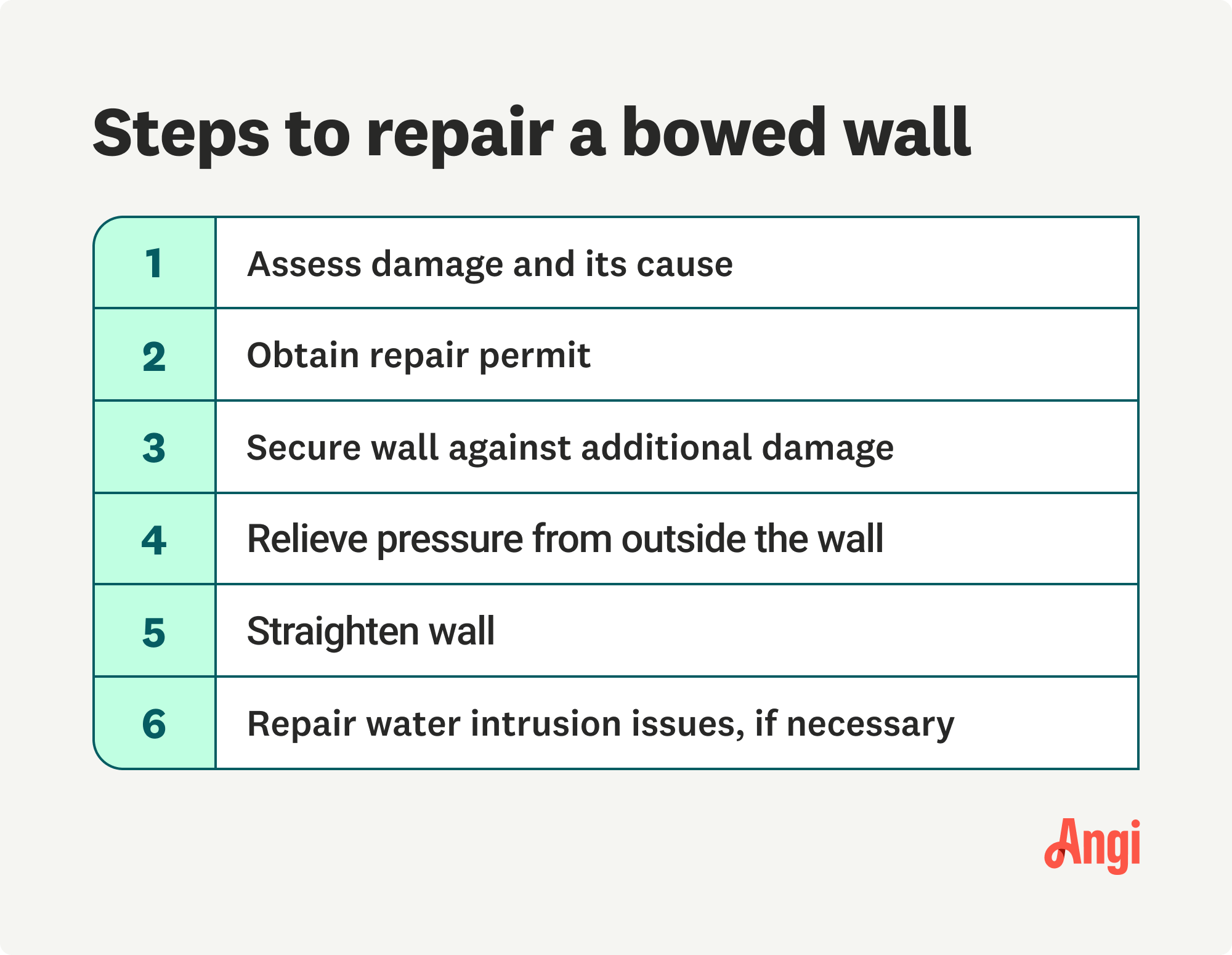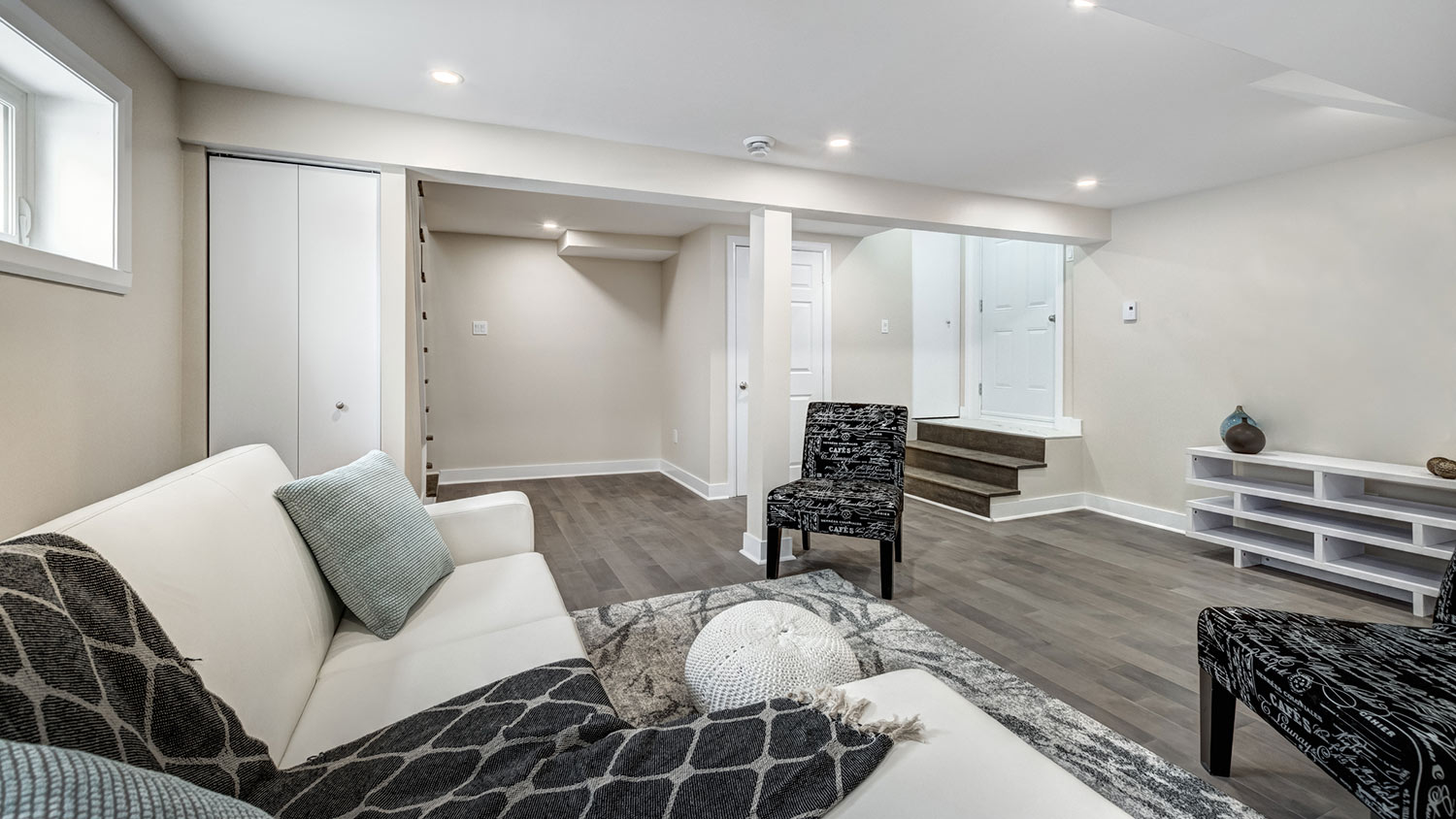How Much Does Bowing Basement Wall Repairs Cost? [2024 Data]
Normal range: $350 - $10,000
The cost to repair a bowing basement wall is $4,500 on average, but it can cost between $350 and $10,000 or more depending on the type of brace you need.


Finding a bowing wall in your basement can be unsettling. The typical cost to repair a foundation is about $4,500. However, major foundation repairs involving beams or piers can cost $10,000 or more. Even if you can’t swing a full foundational repair, you can correct the bowing with internal supports if the decline is 2 inches or less.
- Average
- $4,500
- Low end
- $350
- high end
- $11,000
Bowed Basement Wall Repair Cost Breakdown
Bracing your basement walls involves parts, labor, and finishing once the supports are in place. You should also consider a structural engineer’s report to learn more about the foundation issues that caused the bowing in the first place.
Structural Engineer’s Report
You’ll pay between $250 and $500 for a structural engineer foundation inspection and a report on any necessary foundational repairs. This report is a wise investment, as you’ll receive an objective and accurate evaluation to reference when considering repairs.
“We’ve discovered the great value of structural engineers over the past few years,” says Robert Tschudi, Expert Review Board member and North Carolina-based home builder and remodeler. “Not only do they understand the structural integrity of your house, they know what is needed (support-wise) to do your renovation.”
Parts and Labor
Your basement wall bracing cost usually goes by the anchor or strap rather than by the hour. For wall anchors, you can expect to pay $400 to $700 per anchor every 5 feet. If you’re using steel or carbon fiber straps, these can cost anywhere between $350 and $1,000 per strap for every 5 feet.
Wall Finishing
After the supports get installed, you can finish the wall by painting or installing new drywall. The cost to install drywall is typically between $1.50 and $3 per square foot, while painting an interior wall costs about $2 to $6 per square foot.

What Factors Influence Bowed Basement Wall Repair Costs?
No two walls are alike, and the exact cost of your bowed basement wall repair will depend on a number of factors unique to your home.
Type of Repair Chosen
Several different methods are available for repairing a bowed basement wall. Assuming a 20-foot-long wall, wall anchors will cost between $1,600 and $2,800, steel or carbon fiber straps will cost between $1,700 and $5,000, and helical tiebacks will cost between $6,000 and $7,200. Wall straightening with reinforcement straps will cost from $6,700 to $11,000.
| Type of Repair | Average Cost Range |
|---|---|
| Wall Anchors | $1,600 – $2,800 |
| Steel or Carbon Fiber Straps | $1,700 – $5,000 |
| Helical Tiebacks | $6,000 – $7,200 |
| Reinforcement Straps | $6,700 – $11,000 |
How Much the Wall Has Bowed
Generally speaking, the less your wall is bowed, the less it will cost. You can typically repair any bowed basement wall with bracing options if the deflection is less than 2 inches. If the deflection is between 2 and 4 inches, the situation may still be salvageable but more expensive to repair.
Exterior Wall Conditions
Your bracing options depend on the conditions outside of your wall, too. If there is not enough room for an excavator to dig up the soil near your basement wall, you likely cannot use wall anchors or helical tiebacks. Similarly, if the soil around your basement wall is dense and hard to penetrate, your only option may be reinforcement straps, which are more costly than wall anchors.
Size of the Wall
The longer your basement wall, the more your wall repair will cost. For example, installing wall anchors on a 15-feet-long wall would cost from $1,200 to $2,100, while a 30-foot-long wall would cost from $2,400 to $4,200. The width of your wall is also a factor that affects cost. A wider wall will require longer anchors or tiebacks.
Bowing Basement Wall Repair Cost by Type of Brace
Your wall bracing cost per square foot will depend on the type of braces you’re using. Wall anchors cost more, but you’ll probably need fewer of them, so that’s something to consider when determining your budget.
Note that these solutions won’t take care of the root cause, so you’ll want to assess the soil and invest in a more permanent repair in the future.
Wall Anchors
Wall anchors cost between $400 and $700 each and should be placed every 5 feet. This cost means you can expect to pay $80 to $140 per foot for this type of brace.
To install wall anchors, one steel plate is attached to your basement wall, and another is buried in the ground outside your wall. The two plates are connected with a steel shaft that is tightened to hold your wall in place.
Steel/Carbon Fiber Straps
Steel or carbon fiber straps go for $350 to $1,000 per strap and should go every 4 feet. With that considered, you can expect to pay between $85 and $250 per foot.
Straps are long strips of metal or carbon fiber installed vertically on your basement wall and anchored on the top and bottom. They are often made from steel or carbon fiber and sealed with epoxy for longevity.
Helical Tiebacks
Helical tiebacks are often the most expensive bowed basement wall repair option. Expect to spend from $1,500 to $1,800 per tieback. A tieback should be installed every 5 feet, resulting in a cost of $300 to $360 per foot.
If straps or anchors aren’t heavy-duty enough to fix the problem, helical tiebacks might be your best choice. Helical tiebacks are long steel, screw-like shafts drilled at an angle through your foundation wall into the soil outside your home. The shaft is twisted through a plate or channel attached to your interior wall until a specific torque is achieved.
Wall Straightening
The above options will not make your wall perfectly straight—rather, stop it from bowing any further and maybe remove some of the bow. Consider wall straightening if you want your wall to return to its original, upright state. Basement wall straightening will cost between $250 and $300 per foot, which is in addition to the cost of steel or carbon fiber straps at $85 to $250 per foot. The total cost for wall straightening is $340 to $550 per foot.
A contractor will excavate the soil around the exterior of the bowed wall to relieve pressure, then use hydraulic jacks inside to push the bowed wall back into its original spot. Additionally, reinforcement straps are installed to prevent future bowing.
Additional Costs to Consider
The total cost to complete repairs on a bowing foundation wall may include additional items depending on your situation.
Additional Permit Costs
While most bowing wall repair work will involve acquiring a permit. In some cases where the structural support is compromised and significant repairs are necessary, your municipality may require items such as a structural engineer's plans and signature, a site plan, or a soil test. All these cost additional, ranging from $100 to $2,000.
Structural Repairs
If the house shifts due to a bowing foundation wall or the loss of support, structural repairs may be necessary to ensure the house doesn't experience other trouble. Repairs may include replacing compromised floors, joists, or wall members. Depending on the severity, the minimum cost for structural repairs is about $1,000 but can increase from there.
Water Intrusion Repairs
Bowed foundation walls are often related to water and soil issues. Water infiltration is a common problem when home foundations experience issues. Water entering through foundation cracks can create problems, including mold growth and wood rot. Costs for repairing these issues start at a few hundred dollars and increase from there.
Foundation Drainage Installation
If your structural engineer or soil testing expert determines that your foundation requires a water drainage solution to reduce the potential for future trouble, expect to pay between $25 and $100 per linear foot, depending on the type of drainage necessary.
How Much Does It Cost to Repair a Basement Wall Yourself?
Repairing a bowing basement wall isn’t something you should attempt on your own. Getting the job done right requires the specialized knowledge and skill of a professional. Improper installation can lead to cracking walls or wasted time and money if the repairs don’t work out.
However, this doesn’t mean your DIY skills have to go to waste: You can save money by finishing the walls yourself once the repairs are complete. Below are some breakdowns of what you can expect to pay.
Repainting Basement Walls

Most DIY painting jobs cost between $200 and $300 for supplies and materials. Your biggest cost factor will be the type of paint you choose, as well as the size of your basement. Keep in mind that 1 gallon of paint will cover about 400 square feet of drywall, so plan your budget accordingly.
Along with paint, these are the supplies you’ll need:
Painter’s kit with angled brushes, rollers, and paint trays: $10–$17
Drop cloths and protective coverings for furniture: $2–$20
Painter’s tape: $3–$18
Putty knife: $2–$6
Installing New Drywall
If you want to install new drywall to cover the braces, panels typically cost between $0.40 and $0.65 per square foot. You’ll also need to factor these supplies into your budget:
Joint compound or “mud”: $7 for a 3.5-qt. bucket
Paper tape: $3
Drywall screws: $6
Outside corner beads: $4 per bead
Ways to Save Money on Bowing Basement Wall Repair
Repairing a basement wall costs real money. Unfortunately, there aren't many shortcuts to the solutions that will save money after the damage is present. However, catching the problem early by performing regular DIY inspections on your basement walls is an excellent way to minimize foundation repair costs before they happen.
The next best thing you can do to save big money is to hire a local foundation repair pro at the soonest sign of trouble. Doing so may mean having the ability to do the repair work before more (and more costly) damage occurs.
Brionna Farney contributed to this piece.
Frequently Asked Questions
If the bowing basement wall is less than 2 inches, steel or carbon fiber straps are the best solution. For bowing that is more than 2 inches, wall anchors are the most effective. A contractor can help you decide the best method of repair for your home's foundation and also address the root cause of the trouble.
External pressure on the basement wall can cause it to bow inward. Soil, heavy with water saturation, is typically the main culprit. Called hydrostatic pressure, the soil exerts immense pressure on the wall, causing it to fail, at least partially. Hydrostatic pressure situations can occur after rainfall or simply due to regular groundwater presence and may be temporary or more permanent.
Generally, a wall can bow up to 30% of its thickness, or around 2.5 inches for an 8-inch-thick structure, before it becomes an urgent situation. If your basement wall bows more than 1 inch, it's time to have a basement inspection to determine if a repair is necessary, depending on the soil conditions and structural specifics. Walls nearing 4 inches of bowing will require significant repairs. More than 6 inches of bowing usually means the wall will need replacing.


